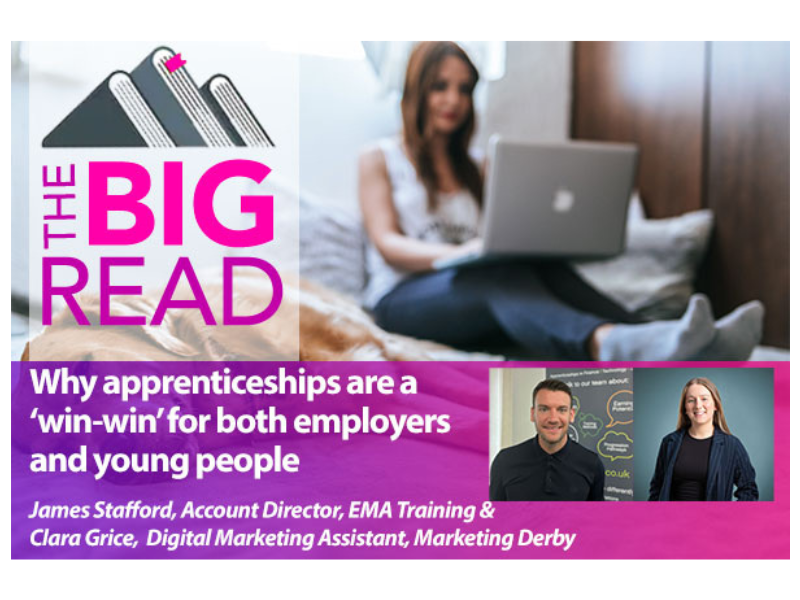Big Read | 22 February 2024
Why apprenticeships are a ‘win-win’ for both employers and young people

Earlier this month, National Apprenticeship Week took place, which celebrated and promoted the value of apprenticeships. Marketing Derby’s Clara Grice recently completed her apprenticeship and is now the inward investment agency’s full-time digital marketing assistant. She was supported in her journey by Bondholder EMA Training. Here, in her own words, we hear from Clara about her apprenticeship journey – but first, James Stafford, account director at EMA Training, talks about how apprentices can boost your business.
JAMES STAFFORD, account director at EMA Training

Q: Hi, James. Tell us a bit about yourself and EMA Training.
A: It was around October 2019 when I first received the call about joining EMA Training.
Back then, EMA was a small accountancy and finance training provider with eight staff members and 50 apprentices enrolled via a subcontract.
At the time, I was working for a much larger, national training provider with a host of blue-chip clients – it was a great role, but I couldn’t help feeling somewhat unfulfilled.
I was advised that leaving was a risk, but after a long conversation with EMA’s managing director, Tracey Mosley, we quickly established that our vision, mission, and values were aligned and the decision to join EMA’s leadership team became an easy one.
I realised that what I’d been missing was the localised delivery. Supporting local employers with their talent attraction to help them scale.
Supporting local young people to ensure they had access to outstanding job opportunities within leading local employers.
And subsequently, supporting the local community by ensuring that Derby’s best young talent stays in the city, contributing to the local economy.
Q: How has EMA Training grown and how has it diversified?
A: EMA is now a team of 40 with over 350 apprentices enrolled on our range of programmes.
We have diversified our offering by adding apprenticeships in payroll, IT, digital support, and marketing to our portfolio, ranging from Level 2 (GCSE equivalent) to Level 7 (master’s degree equivalent).

Q: How does EMA differ from its competitors?
A: As a leadership team, we had a clear vision of what we wanted for EMA.
In a sector where most training providers were opting for remote delivery, our strategy was firmly based around high-quality, face-to-face training from regional hubs.
Whilst remote and on-demand delivery provides flexibility and inclusivity for staff and students based further afield, it often fails to garner an environment which harnesses learner participation, collaboration, and camaraderie between peers.
We are acutely aware of issues around digital poverty. Remote delivery often requires apprentices to attend sessions via their own personal computer if they don’t have access to a laptop at work.
One learner could be using a brand new, ninth generation i7 laptop set up in a quiet study, while another is having to login on a much older or lower spec device from their kitchen table.
The physical classroom model, therefore, promotes equality, diversity and inclusion and enables all students to share the same high-quality learning experience.
Q: What is your demographic when it comes to apprentices?
A: Whilst we support many mature learners through apprenticeships and recognise the value in utilising apprenticeships for professional development, our passion is very much the 16-24 demographic who are embarking on their first professional role – a true apprentice if you like.
Q: Why do employers take on apprentices?
A: Employers choose to hire apprentices for a variety of reasons, but here are the three most common reasons why employers may look to hire an apprentice.
Firstly, it’s a cost-effective way of growing the team. As of April 1, 2024, the Apprentice Minimum Wage will increase to £6.40 per hour, which equates to around £12,500 per annum based on a 37.5-hour week.
Whilst our consultants always recommend paying more than the apprentice wage, we also recognise that employers will need to invest significant time and resource into training the apprentice, particularly within the first six months.
The lower salaries make this commitment more financially viable, particularly for SMEs, where budgets may be more restrictive.
Secondly, apprenticeships are a great way to attract fresh ideas and perspectives into the business.
In a job market where people are moving around much more frequently, succession planning is becoming ever more important within HR and L&D functions.
Apprentices tend to learn very quickly, and a well-executed early careers strategy will help to retain knowledge and IP within an organisation when experienced staff move on.
And finally, the ability for employers to mould a young mind to how they want them to operate within their organisation.
It is often much easier to train someone from scratch on how to perform a task, as opposed to re-training them from how they were doing it in a previous organisation.
Q: And what are the benefits of being an apprentice?
A: Apprentices benefit hugely from the scheme. Not only are they accessing up to £21,000 of government funded training, but they are also being paid a wage, whilst being trained by experienced industry professionals.
They will be afforded a minimum of 20% off the job time for new learning, which can be a combination of workshops, job shadowing in the workplace or getting involved in projects at work that meet apprenticeship criteria.
Employers often pay for professional fees such as registration fees with professional bodies and exam fees.

In recent years, the reputation of apprenticeships has continued to grow, and many young people who may have chosen the university pathway, are now looking to apprenticeships as a genuine alternative.
As young people become more educated about apprenticeships, they are recognising that rather than spending three years at university amassing upwards of £50,000 debt, they could be getting paid on an apprenticeship whilst having their professional certifications paid for and gaining valuable work experience.
Q: Is there an apprenticeship to suit everyone?
A: With over 1,300 apprenticeship standards available and over 1,800 providers approved to deliver, choice shouldn’t be an issue for any aspiring apprentice.
EMA work with over 200 apprentice employers, which operate in a variety of sectors including local authorities, NHS trusts, charities, regional accountancy firms, IT managed service providers, marketing agencies, professional sports clubs, and global brands.
Q: Have you had many success stories?
A: After celebrating my 10th year of working in this sector, I feel privileged to have experienced lots of examples where the apprentice who was placed years ago has gone on to gain full-time employment and even become the hiring manager for the next generation of apprentices.
Q: What would your advice be to any young person considering an apprenticeship?
A: I would advise any young person to explore apprenticeships when looking at their higher education or career options.
With the vast number of apprenticeships available and the large number of employers participating in the scheme, there is an option for everyone.
Whilst sixth form, college or university can be a great option for some, those young people who learn better in a hands-on, practical environment may just find an apprenticeship to be the perfect fit.
CLARA GRICE – digital marketing assistant at Marketing Derby and former EMA Training apprentice

Q: Hi, Clara. Tell us a bit about yourself and your career/education to date.
A: Before undertaking my apprenticeship, I studied Hispanic Studies with Polish at the University of Sheffield.
After completing a year abroad and my degree, I moved back to my home city of Derby.
After finishing my degree, I was in a bit of a rut. Although I loved what I had studied, I wanted to expand my skills and do something that, in the future, I could use alongside my languages.
Although I loved my university experience, I knew I didn’t want to go further into student debt learning this skill.
After speaking to friends who had chosen an apprenticeship over university, and now had a qualification and were earning money, I decided an apprenticeship would be the best fit.
However, I wasn’t sure if I would be eligible to do an apprenticeship. I always thought they were only for people who had just left school and I thought I was too old to complete one, but I was wrong.
Q: Why did doing an apprenticeship seem like an attractive proposition?
A: I loved going to university, and I learned so much from the tutors. However, what I learned didn’t really prepare me for the working world.
I knew an apprenticeship would be great at teaching me skills in the workplace- and not just the knowledge. I also liked the aspect of learning and earning.
Q: Why did you choose your particular apprenticeship? Have you always been interested in digital?
A: I chose to complete a Junior Content Creator apprenticeship as I am a creative person and I felt like this course would allow me to express that creativity. I also really like the variation of what the course taught.
Q: Tell us about the role EMA Training played in your apprenticeship?
A: EMA was very supportive throughout my apprenticeship. Firstly, I went into college once every two weeks where I and other apprentices would have a day of learning. I would also have check-in calls with my tutor around once a month.
What I enjoyed about these calls was not only discussing my progress in my apprenticeship, but I would also work with my tutor to set myself personal goals with some of mine being wake up earlier to walk my dog before work or drinking more water etc. They really do care about you and not just your apprenticeship.
Q: What did you have to do for your apprenticeship? How beneficial was it to experience the world of work while learning (and earning)?
A: My apprenticeship consisted of going into the EMA college once every two weeks and spending the rest of the time in my workplace. I really enjoyed the classes, and I made some great friends on my course.
The classes were very helpful, and the classes were mixed from sitting down learning to hands on training.
I was always excited to go into work after my day at college and implement what I had learned.
I also had to complete learning journals throughout my apprenticeship. This is where I would write about new learning I had undertaken whilst at work.
These were good for keeping me accountable to my learning and so that EMA could keep track of my progress.
Q: You have now completed your apprenticeship and have secured a full-time position with Marketing Derby. How does that feel and how are you enjoying your job?
A: I have now finished my apprenticeship with a distinction, and I am now working full-time as the digital marketing assistant at Marketing Derby.
I really enjoy my job and how I’m able to apply what I learned during my apprenticeship into my day-to-day role, from working on our business newsletters to running our social media accounts and helping raise the profile of Derby and our brilliant Bondholders..
Q: What would you say to other young people who are considering doing an apprenticeship?
A: I would say to anyone considering an apprenticeship that it will probably be one of the best choices you can make. I think when we leave school, we are told we need to go to university, and that is a great option for a lot of people, but it isn’t the only option.
*To find out more about the range of apprenticeships offered at EMA Training visit https://www.ematraining.co.uk/ .


